И делает это не недисциплинированный потребитель, а целая компания-поставщик. А суд именем Украины и на основании закона благословляет этот обман.
Куда при этом идти жаловаться человеку, которому насчитали сотню тысяч гривен долга, если у него просто нет таких денег? Не говоря уже об ощущении полной несправедливости, которое подарило ему государство во время войны.
Ниже — история борьбы маленького человека против большой компании.
Снабжение по-новому
Новая эра отношений между электроэнергетическими компаниями и их абонентами началась в Украине 1 января 2019 года — поставки электроэнергии были разделены на два процесса: распределение и… опять-таки поставки. Распределение отдали так называемым операторам системы распределения (ОСР) — это те же облэнерго, что и раньше, а вот «поставками по-новому» стали заниматься так называемые энергоснабжающие компании (ЭК). Они, правда, не поставляют электроэнергию в буквальном смысле этого слова (как до этого делало облэнерго), они формально покупают ее на рынке и формально продают абонентам, а реально они лишь собирают деньги за электричество.
При этом львиная доля идет именно операторам системы распределения, например, в Киевской области «ДТЭК Киевские региональные электросети» в январе этого года получила 81% суммы платежей. (Ну, а 19% комиссионных для ЭК очень неплохо!) При этом энергоснабжающие компании не контролируют и даже не снимают показаний счетчиков, не печатают и не рассылают квитанций, абонент сам должен это делать — снимать и передавать показатели своего счетчика. Если он вдруг этого не сделал, то показатель определяется «расчетным» путем, о чем подробно будет ниже.
Стоит заметить, что, например, в США в дом или квартиру заходит один кабель, но поставлять электричество могут аж три компании на разных условиях, и они конкурируют за абонента. Почему у нас этого нет? Ответ прост: в Украине нет розничного рынка электроэнергии. Хотя поставляющих компаний куча, но из-за регулируемой (фиксированной) цены о какой-либо конкуренции не может быть и речи. Написать и утвердить Правила розничного рынка электроэнергии можно (которые Нацкомиссия, осуществляющая госрегулирование в сферах энергетики и коммунальных услуг, скопировала с ЕС), но это автоматически не создает рынок.
Для чего же НКРЭКУ через целый ряд нормативных актов создала институт энергоснабжающих компаний, очень похожий, откровенно говоря, на «прокладку»?
Понятно, что когда обычные облэнерго превратились в ОСР, то передали всех своих абонентов в ЭК. Эта передача произошла тихо и без лишних церемоний: новые поставщики опубликовали на своих сайтах типовой договор и приписали, что это договор присоединения, то есть от него нельзя отказаться и вносить изменения тоже нельзя. Единственное, что можно, — взять поставщика из другой области, но какой смысл? Цена у всех одинаковая, на то время — 0,90/1,68 грн. Итак, все сельские бабки и городские деды, прочитав на своих компьютерах и смартфонах договор, единодушно присоединились и «перешли» от одного пана к другому. Как крепостные.
Все было бы ничего, но фишка в другом: логично было бы зафиксировать показатели счетчиков по состоянию на 1 января 2019 года. Однако для поставляющих компаний это были бы лишние хлопоты, и они этого не сделали (видимо, у них были и другие резоны), а что касается абонентов, то, разумеется, никто об этом и подумать не мог. А зря. Со временем оказалось, что некоторые из них имеют огромные долги перед новоявленными поставщиками. Откуда же они взялись?
Как работают счетчики ДТЭК
Абонент А (фамилия скрыта, но случай реальный), приехав зимой в сельский домик, нашел в калитке клочок бумаги (см. доп. 1) — корешок наряда на отключение и отрезанные электрические провода. На корешке был указан долг — 96 084 грн и дата — 22.01.2020. Излишне говорить, что никаких предупреждений ни о долге, ни о возможном отключении он не получал, хотя это предусматривают Правила розничного рынка электроэнергии, установленные НКРЭКУ. Абонент устроил скандал, и электроснабжение восстановили, но долг никуда не исчез, более того, он вырос!
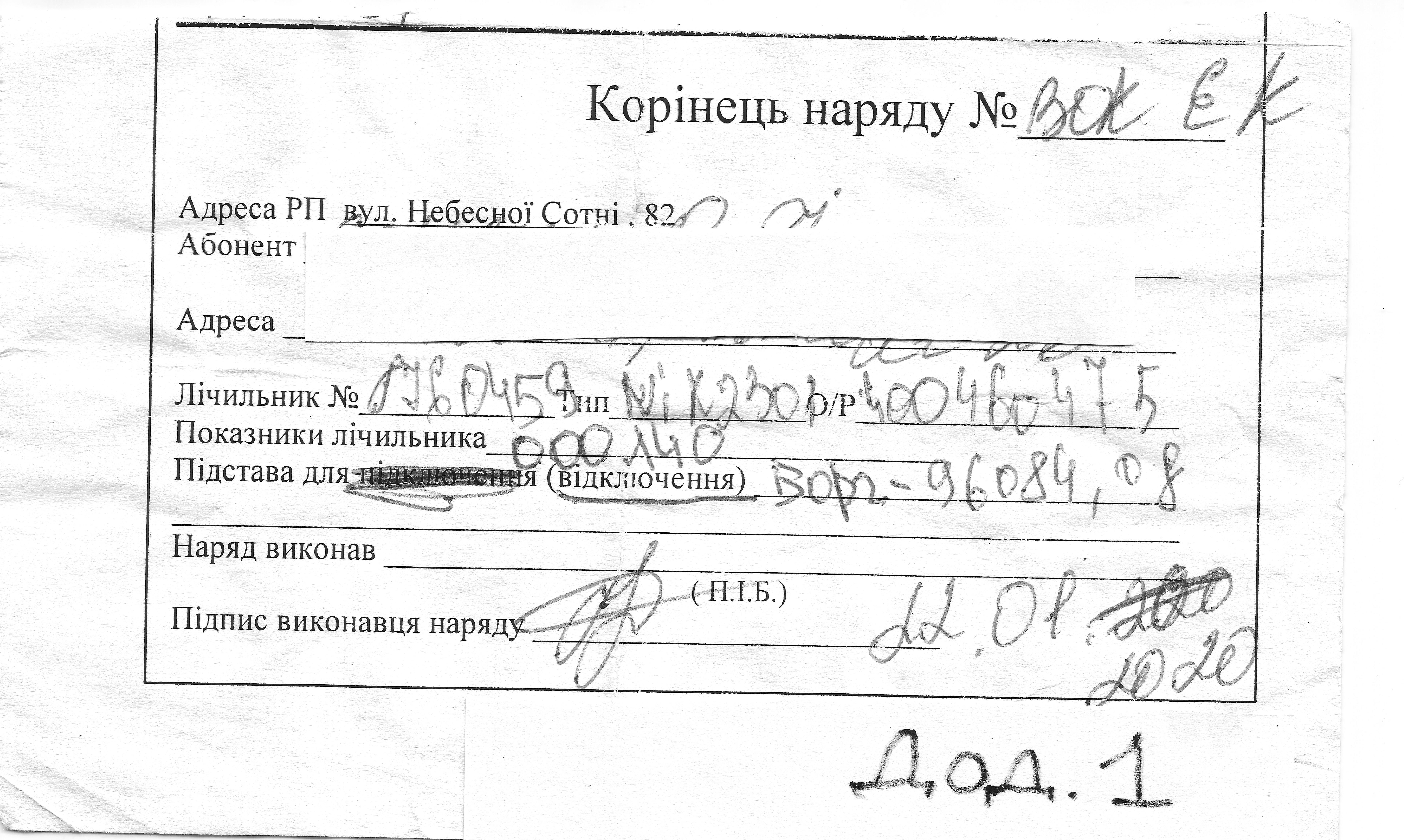
В платежке по состоянию на 31.01.2020 (см. доп. 2) был указан долг 102 427 грн — за несколько дней (без проводов!) чудесным образом «набежало» еще 6 тыс. грн. Однако это не все чудеса, на скрин-шоте с сайта поставщика ЧАО «Киевоблэнерго» (см. доп. 3) тогда высвечивалось, что в январе предыдущего 2019 года абонент А потребил 19 тыс. кВт-ч, в феврале — 18 тыс. кВт-ч, а в марте — более 7 тыс. кВт-ч. Это прямо противоречило законам физики, известным со школы, — счетчик просто не может накрутить такие показатели даже при круглосуточном максимальном потреблении.
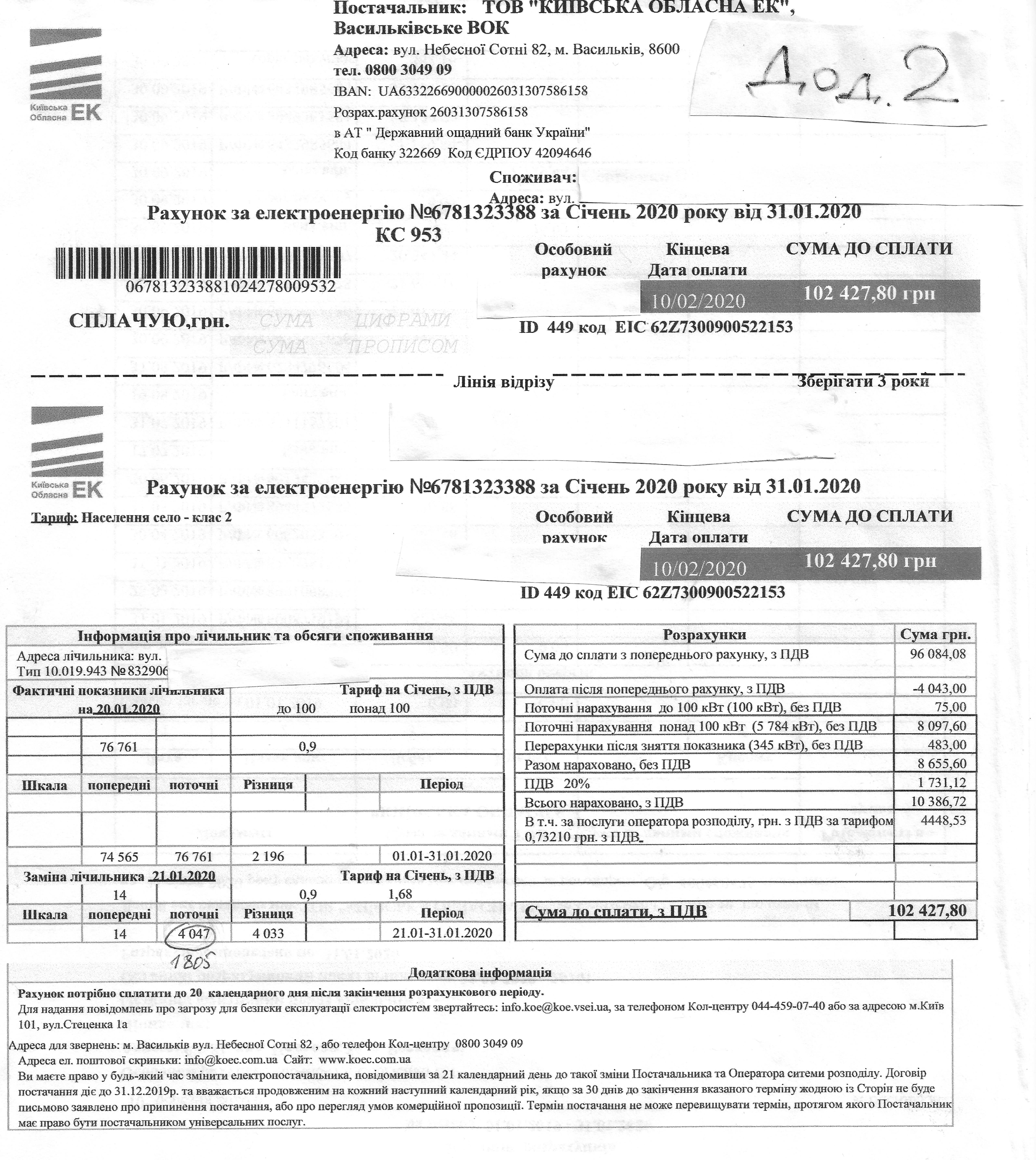
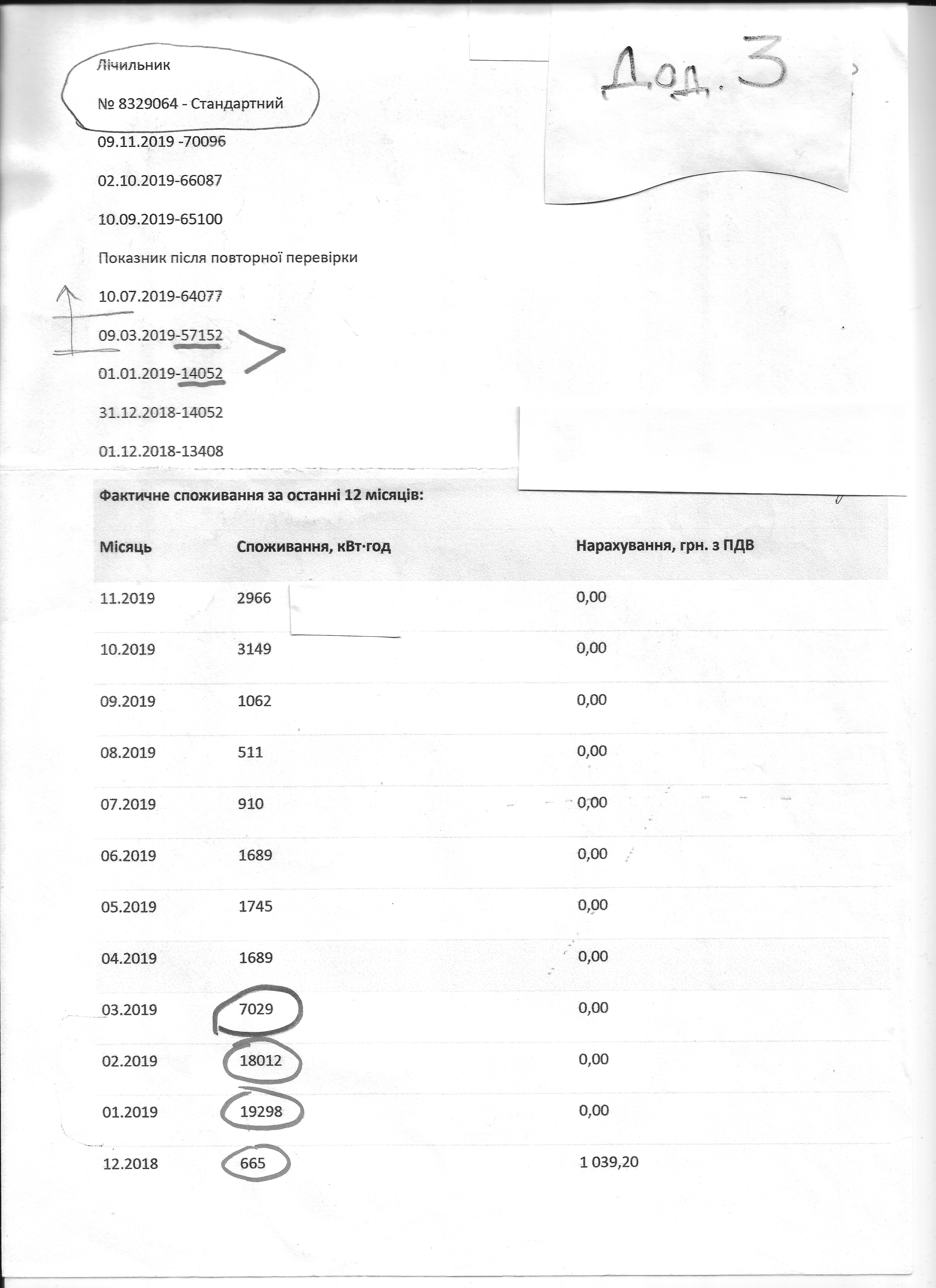
Абонент А обратился в «ДТЭК Киевские региональные электросети», чтобы проверить счетчик, может он неисправен, оказалось — исправен. Тогда абонент написал заявление в ДТЭК с просьбой отменить эти фантастические показатели, а остальное он обязывался погасить. Заявление рассмотрела специальная комиссия в составе представителей НКРЭКУ, Государственного энергонадзора и других специалистов. На день проведения заседания показатели потребления электроэнергии на сайте «Киевской областной энергоснабжающей компании» (КОЭК) исчезли, а комиссия зафиксировала в своем протоколе (см. доп. 4) вполне «приличные» показатели: за январь — 536 кВт-ч, за февраль — 425 кВт-ч, а вот за март — «неприличные» 51 904 кВт-ч! Очень уважаемая и высококвалифицированная комиссия решила: все правильно. Иными словами, счетчик может накрутить если не 19 тыс., то 51,9 тыс.
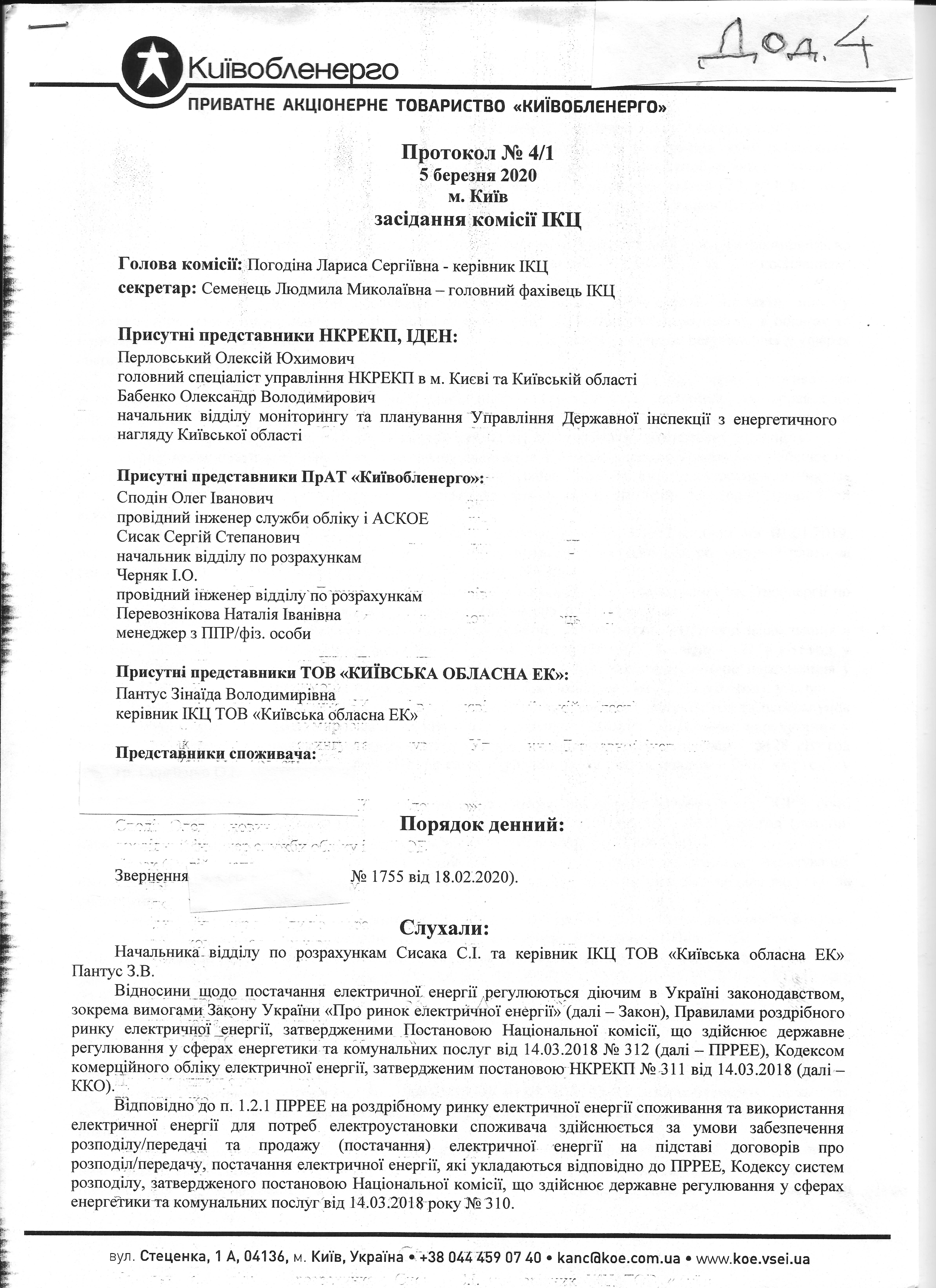
Припертый обстоятельствами «к электрическому столбу» абонент А решил заключить договор реструктуризации долга, как рекомендовала комиссия ДТЭК, и параллельно решать вопрос размера долга. Почему? Потому что боялся, что его «обрежут», и доверился слову компании. Он обратился в «Киевскую областную энергоснабжающую компанию» с соответствующим заявлением о реструктуризации на срок 60 месяцев (что было предложено в бланке договора КОЭК), также по требованию КОЭК он подал справку о доходах. Но компания подумала и… отказала. Абонент подал второе заявление — на 36 месяцев. Компания подумала и… снова отказала. Когда абонент подал третье заявление, представительница компании ответила: «Киев согласовал вам семь месяцев». И прямо намекнула на кусачки. Хотя ежемесячный платеж превышал размер пенсии абонента в семь раз(!), договор он… подписал, но на следующий день обратился в суд. В иске он просил суд отменить явно неправомерную часть долга и установить посильный срок реструктуризации.
Как работает Киево-Святошинский районный суд
Вера неискушенного в судебных тяжбах абонента А в законы физики, здравый смысл и элементарную справедливость оказалась, как показали события, наивной. Киево-Святошинский районный суд в лице его председателя Татьяны Дубас после длительных заседаний вынес «логичное» решение: если абонент А подписал договор реструктуризации, значит, он признал размер долга. Точка. А из этого следует, что счетчик все-таки может накрутить 51,9 тыс. кВт-ч за месяц!
В отчаянии абонент А обратился в тот же Киево-Святошинский районный суд с требованием расторгнуть этот злосчастный договор. И на это был целый ряд оснований, предусмотренных Гражданским кодексом Украины, — отсутствие свободного волеизъявления сторон, несоответствие договора требованиям разумности и справедливости, наличие давления, то есть угрозы отключения электричества. Судья Наталья Пинкевич вынесла решение, которое стоит того, чтобы его процитировать: «Свобода договора проявляется также в возможности, предоставленной сторонам, определить условия такого договора» и «Ссылка истца на то, что договор реструктуризации был заключен им под принуждением и давлением путем угроз об отключении электроэнергии… суд во внимание не принимает». Могла ли судья Пинкевич решить дело вопреки предыдущему решению председателя этого самого суда? Это вопрос.
А тем временем «Киевская областная энергоснабжающая компания» не сидела сложа руки. Пока первое дело тянулось в Киево-Святошинском районном суде, КОЭК подготовила иск о взыскании задолженности с абонента А и подала его по месту прописки абонента А — в Святошинский суд Киева. При этом директор компании Светлана Сохатюк, подписывая исковое заявление, просила суд рассмотреть дело «без вызова сторон», то есть втихаря, чтобы абонент А и не знал об этом иске. А там, глядишь, исполнительная служба просто арестует и продаст его авто или квартиру и вернет спорный долг. К счастью абонента А, суд решил рассматривать дело по обычной процедуре, а когда узнал о том, что одновременно по этому делу идет другой судебный процесс, остановил рассмотрение до его окончания.
Как ДТЭК считает долги
Когда первая судебная тяжба дошла до Киевского апелляционного суда, выяснилось одно обстоятельство, на которое раньше никто не обращал внимания. В протоколе комиссии ДТЭК на странице 3 (см. доп. 4) черным по белому записано: «27.10.2018 представителем Общества (ЧАО „Киевоблэнерго“. — А.С.) зафиксировано показ 32000, 10.12.2018 представителем Общества зафиксировано показ 42253». И далее: «На 31.12.2018 потребителем не предоставлялся фактический показатель прибора учета, поэтому определение конечного показа 14052 на 31.12.2018 было проведено в соответствии с положениями ПРРЕЕ и ККО». Чувствуете логику мышления ДТЭК? Счетчик показал сначала 32 тыс., потом — 42 тыс, а потом… 14 тыс. кВт-ч. Однако эта «логика» не вызвала никаких сомнений у судейской коллегии в составе Ящук Т.И., Малахай Л.Д. и Немировской О.В., и она решила — долг начислен правильно. Ну что ж, абсурдные последовательности логичны лишь в одном случае — когда сам суд находится в состоянии абсурда.
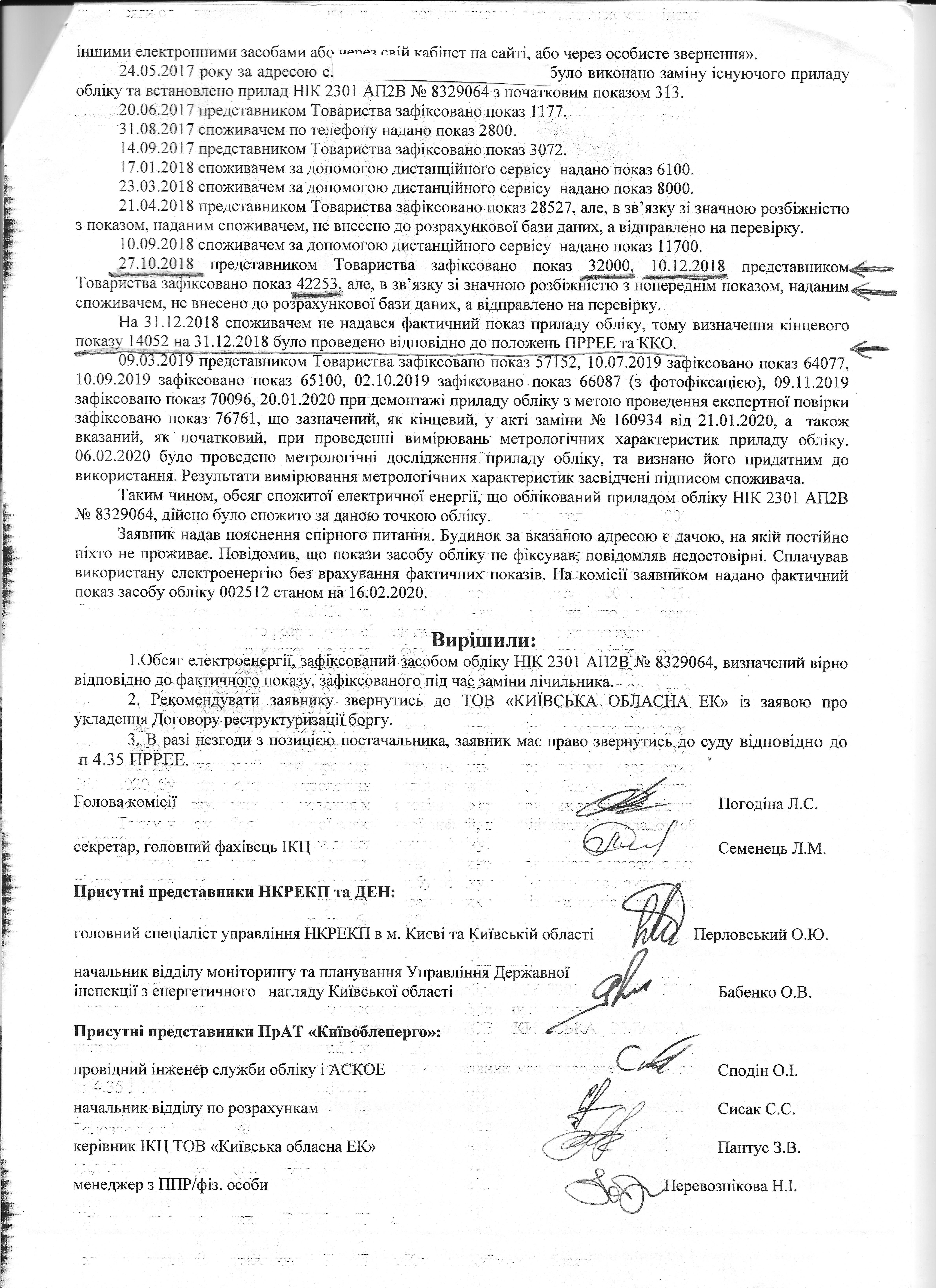
Что же это за магические аббревиатуры ПРРЭЭ и ККО, перед которыми склонились почтенные судейские мантии? Это Правила розничного рынка электроэнергии и Кодекс коммерческого учета электроэнергии, которые устанавливают расчетный способ определения показателя счетчика. Как? Просто как в школе — берут разницу между двумя фактически установленными показателями, делят на число дней между ними и таким образом определяют среднесуточное потребление электроэнергии. Затем по нему определяют показатель на нужную дату. Если провести эти нехитрые вычисления с показателями на 27 октября и на 10 декабря 2018 года, то получится, что на 31 декабря 2018-го (то есть на 1 января 2019-го) показатель счетчика составил 47146 кВт-ч. Следовательно, претензии ДТЭК и КОЭК были преувеличены на 47146 — 14052 = 33094 кВт-ч, а если в деньгах (по 1,68 грн), то это 55 597,92 грн. Получается, что ДТЭК может быть обманута счетчиком, и суд поддержит правомерность этого обмана.
Можно ли выиграть суд у Ахметова?
Самая большая проблема старых облэнерго заключалась в том, что по закону они не могли взыскать долги сроком более трех лет. Кроме того, на них висели еще разные безнадежные долги — банкротов, ликвидированных предприятий и других. Но если передать их скопом новым «снабженческим» компаниям типа КОЭК, которые не фиксируют ни сроков, ни происхождения долгов, а лишь их размер, то можно разбрасывать их «на своих и чужих» как угодно — компьютер под рукой! Теперь становится понятным, почему снабжающие компании не горели желанием фиксировать показатели счетчиков на 1 января 2019 г. Конечно, подавляющее большинство абонентов придирчиво следят за показателями, но страшная российско-украинская война оторвала миллионы людей от своих домов и счетчиков, поэтому после их возвращения (дай Бог!) домой случай с абонентом А вместо экзотического может превратиться в повседневный. Потому что вся украинская система отношений потребителей и предоставителей — хоть электроснабжения, хоть коммуналки, хоть судопроизводства — построена по «модерновому принципу Аль Капоне»: людей можно грабить и без пистолета — одним «добрым словом». Подвесив дело в бесконечных апелляциях.


